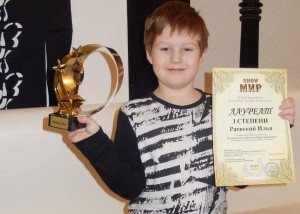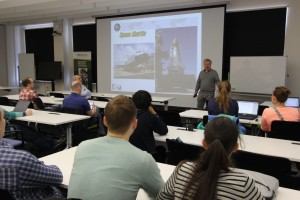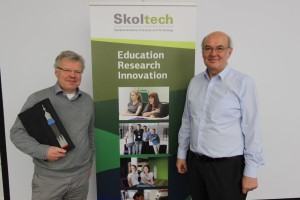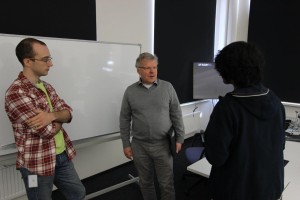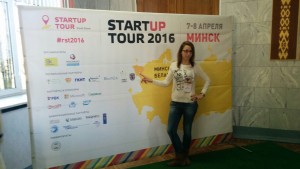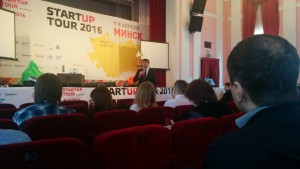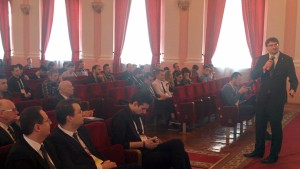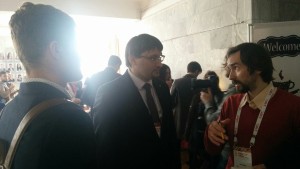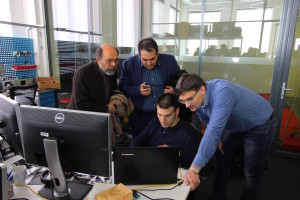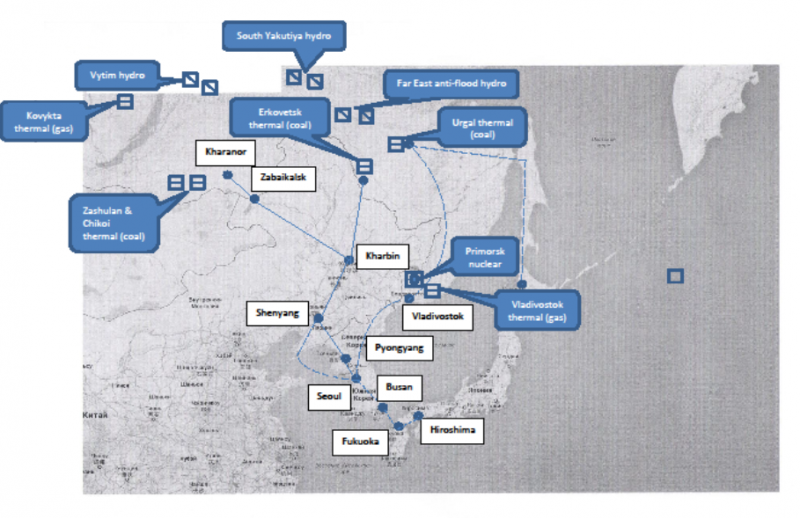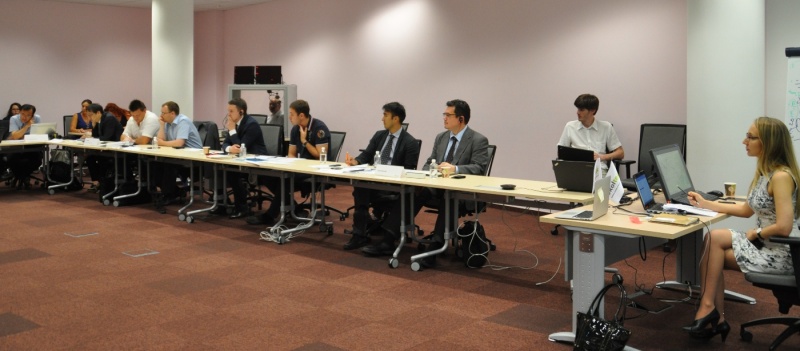We are pleased to invite you to the fourth Skolkovo Robotics conference and exhibition. This year it is being held in an open-air format for the first time.
Skolkovo Robotics will be held in and around the Technopark at the Skolkovo innovation center on May 20 from 9 am to 9 pm. Attendance is free of charge, and all events are held in both English and Russian. To see the full program and register for the event, click here.
The assembly of robot makers, now in its fourth year, comprises both a conference and an exhibition, and this year is being held in an open-air format for the first time.
“Remember the Boston Dynamics video, where the robot Atlas went outside for a walk? This year, we’re taking our robots outside the exhibition to walk around Skolkovo,” said Albert Yefimov, head of the Skolkovo Foundation’s Robocenter, the event’s organizer.
“Skolkovo was created as an exposition platform for high technology. I see this as an open-air exhibition of the achievements of robotics,” said Yefimov. “We’ll show what city robot technology really looks like.”
The event, which is free of charge to attend, is aimed both at those working in the robotics industry and those simply interested in bionic beings, and is one of the biggest of its kind in Europe.
“We are trying to make the event useful for as wide a circle of people as possible, with a focus on those who make or want to make robots,” said Yefimov.
“Our aim is that people should leave the conference thinking: ‘Why didn’t I get involved in robotics earlier?’ or ‘Why didn’t I know that it could be done like that?’”

Robocenter head Albert Yefimov giving a robot a helping hand at last year’s Robotics event. Photo: Robocenter.
The conference is divided into eight themed sections devoted to the use of robotics in the fields of medicine, industry, agriculture, driverless technology, education, deep learning, design and marketing.
“We want to cover as many aspects as possible of the interaction between man and machine,” said Yefimov.
Robots without borders
About 80 experts from countries including the U.S., Germany, France, Singapore, Denmark, India, Israel and Australia will take part in Skolkovo Robotics 2016, including representatives of leading companies, institutes and foundations working in robot technology and artificial intelligence.
They will take to the main stage of the conference to take part in panel discussions devoted to topics including robot companions for seniors, the Asian robot market, robot-assisted surgery, driverless vehicles, drones and marine robotics.
This year’s speakers include Manohar Paluri from Facebook AI Research, an expert in the field of visual recognition technology, and Nathan Harding, the co-founder of Ekso Bionics, one of the world’s first producers of exoskeletons. He will talk about human exoskeletons, which can augment human abilities and enable disabled people to walk again.
“At Skolkovo Robotics 2016, I am hoping to meet robotics professionals working in parts of the world that are not currently part of my network,” said Harding. “I am hoping to see how they are approaching robotic solutions differently in ways that may be useful for those of us working in the U.S.”
Andra Keay, head of the Silicon Valley Robotics industry group and one of the most influential entrepreneurs in Silicon Valley working with robotics startups, will talk about how the robotics revolution is unfolding and why Silicon Valley is currently winning the robotics race.
Returning to Skolkovo Robotics for the third time is Frank Schneider of the Fraunhofer Institute for Communication, Information Processing and Ergonomics, a German research facility. He will talk about real world trials and competitions for unmanned systems in the field of civil defense, emergencies and elimination of consequences of natural disasters. Unmanned aerial, ground and underwater vehicles are now used widely by disaster relief agencies across the world to access areas that are impossible or dangerous for humans to reach.
“We are eager to learn from the Russian robotics community (e.g. the use of robots through EMERCOM [the Emergency Situations Ministry]), meet experts and mingle with innovative start-ups,” said Schneider.
Also speaking at the conference is Catherine Simon, organizer of the Innorobo robotics event in Paris that will be held immediately after Skolkovo Robotics, on May 24-26. Several Skolkovo companies will head straight to Innorobo following Skolkovo Robotics.
“It’s very important for us that high-ranking foreign speakers are coming to the event,” said Yefimov. “For the dialogue between innovators and scientists to stay alive, we must give it constant support.”
The event will also feature four master classes, including one by Skolkovo resident company CAPK, which will teach visitors to fly coptors. CyberTech Labs, another Skolkovo resident, will hold master classes on educational robotics for adults and children together with Skolkovo Robocenter partners National Instruments technology center and the League of Robots.
Robots on parade
The exhibition part of the event will showcase more than 40 startups working in robotics from around Russia, said Skolkovo Robotics’ program director Olga Avryasova.
“This year we are seeing a wider spectrum of applications among the projects, as well as growth in the number of exhibitors,” said Avryasova.
“Forty percent of them are already resident companies of the Skolkovo Foundation. But the other 60 percent are completely new companies that are exhibiting at Robotics for the first time, including at least four new exoskeleton projects,” she said.
Avryasova said that all the teams working on civilian drones in Russia, and all the Russian producers of roboticised prosthetic limbs, would present their work at the event.

Some of the participants of last year’s Skolkovo Robotics pose for a group photo. This year’s event will see the robots take to the streets of the innovation center. Photo: Sk.ru.
The aim of the exhibition is not only to show off Russian achievements in the field of robotics. The overall manifesto of the Skolkovo Foundation is to help its resident tech startups commercialize their products, and the Robotics event is no exception. Representatives of major companies and venture capital funds will also be in attendance at the event.
“We invite clients to our events who can tell the innovators which direction to move in, and what needs to be done,” said Yefimov.
“We’d like to see results at least as good as in previous years – that’s new contracts and partnership agreements,” said Avryasova.
“Of course, the results are not always immediately obvious – contracts are not signed at the conference itself or the next day. But talking to the companies reveals that their first contact with future investors and partners was made at Skolkovo Robotics,” she said.
The Robocenter also expects to attract new residents as a result.
“We expect new stars to appear who will be interested in the opportunities presented by the Skolkovo Foundation, and we expect the Robocenter to get new participants,” said Avryasova.
“Robot technology is today one of the leading areas of global tech development, and at Skolkovo we pay particular attention to this field,” said Skolkovo Foundation president Viktor Vekselberg. “This is attested to by the creation two years ago of the Skolkovo Robocenter, which already unites about 60 Russian companies,” he said.
Robot talent show
Skolkovo Robotics is organised in cooperation with the Skolkovo Institute of Science and Technology (Skoltech). The head of Skoltech’s space robotics lab Dzmitry Tsetserukou will speak at the conference, along with his colleague, Professor Dmitry Vetrov.
“Significant input comes from Skoltech in the form of the robotics startups founded by its students,” said Avryasova, adding that the startups will be represented at the exhibition.
At least half of the Skolkovo resident startups set up by Skoltech students or graduates are robotics projects, according to Yefimov.
Following the conference part of the event, visitors to Skolkovo Robotics can prepare to be wowed by the entertainment program organised by Moscow Technological Institute (MTI) – the event’s general partner – with whom Skolkovo also organizes the popular annual Robonoch (Robonight) event.
In addition to the traditional robot dance shows and a film screening, there will be an exhibition of pictures, more performances by robots and much more, the organizers promise.
Text: Shura Collinson, Sk.ru



